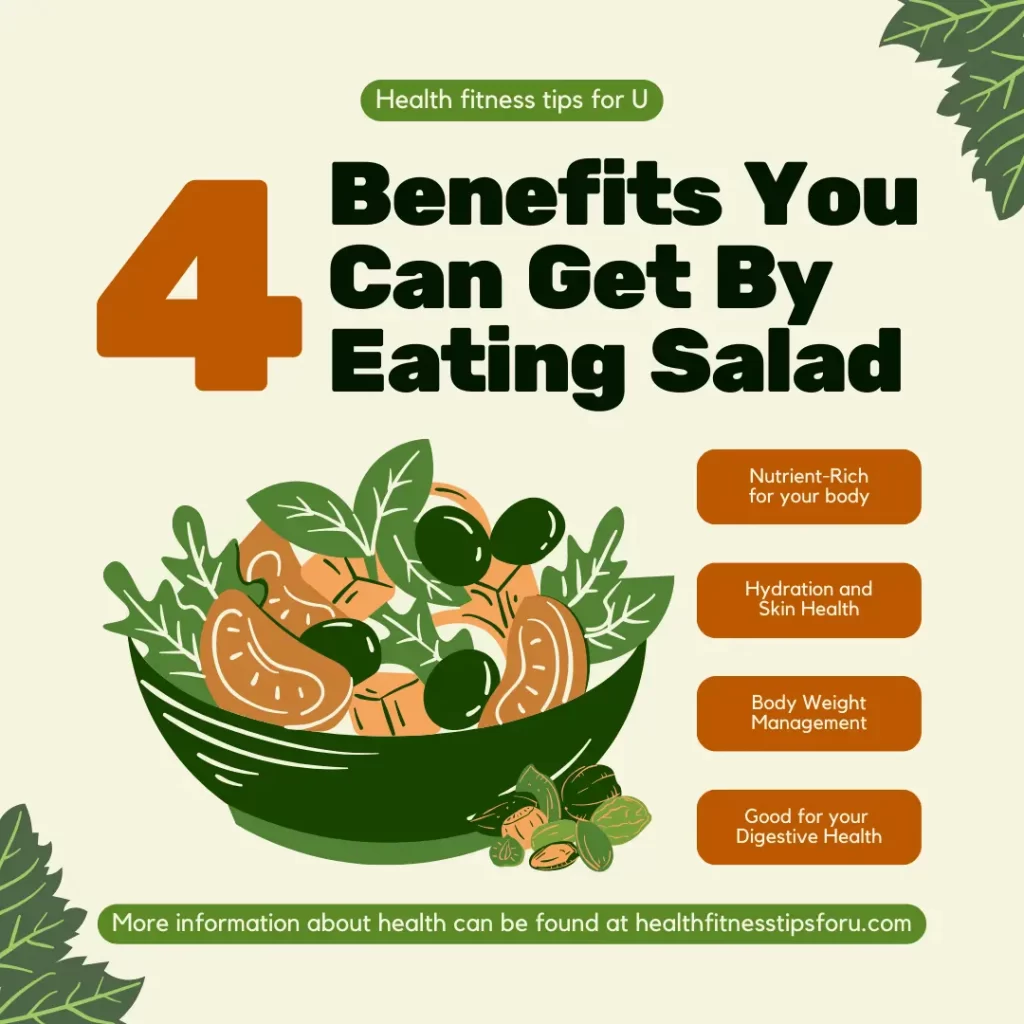Eating Salad: Salads have long been recognized as a cornerstone of a healthy diet, and for good reason. Whether it’s a simple green salad, a fruit salad, or a more complex creation, adding a variety of fresh vegetables, fruits, and nuts to your meals provides immense health benefits. Salads are not only delicious and refreshing, but they are also a powerhouse of essential nutrients that fuel your body, support skin health, aid in weight management, and promote optimal digestion.
In this article, we will explore four key benefits you can get by incorporating salads into your daily diet: nutrient density, hydration for skin health, weight management, and digestive support.

1. Nutrient-Rich for Your Body
One of the primary reasons eating salads are such an integral part of a balanced diet is their high nutrient content. Vegetables, fruits, nuts, seeds, and lean proteins commonly found in salads are packed with essential vitamins, minerals, and antioxidants. These nutrients are crucial for maintaining various bodily functions, including immune support, cellular repair, and energy production.
A Variety of Vitamins and Minerals
By adding a range of colorful vegetables like spinach, kale, carrots, and bell peppers to your salad, you get an excellent mix of vitamins and minerals. Leafy greens, for instance, are rich in vitamins A, C, K, and folate, all of which contribute to the proper functioning of your immune system, skin health, and even bone strength. Carrots and tomatoes add beta-carotene, a precursor to vitamin A, which supports vision and skin health.
Antioxidants for Cellular Protection
Salads, particularly those containing dark leafy greens and brightly colored vegetables, are abundant in antioxidants such as vitamin C, vitamin E, and carotenoids. Antioxidants play a vital role in protecting your cells from oxidative stress caused by free radicals. This cellular protection helps reduce the risk of chronic diseases like heart disease and cancer. The more diverse your salad ingredients, the more antioxidants you’ll get, boosting your body’s ability to fight off disease.
Healthy Fats and Protein
Adding toppings like avocado, nuts, seeds, or lean meats not only enhances the taste and texture of your salad but also boosts its nutrient profile. Avocados, for example, are a good source of heart-healthy monounsaturated fats, which help lower bad cholesterol levels. Nuts and seeds provide omega-3 fatty acids, known for their anti-inflammatory properties, along with plant-based protein. The presence of protein in your salad also supports muscle repair and growth, making it a well-rounded meal choice for those leading an active lifestyle.
2. Hydration and Skin Health
Staying hydrated is crucial for maintaining your overall health, and eating salads can be an effective way to boost your hydration levels. Many vegetables and fruits commonly used in salads, such as cucumbers, lettuce, and tomatoes, have high water content, which can aid in keeping you hydrated throughout the day.
High Water Content for Hydration
Hydration is key to ensuring your body’s vital systems are working efficiently, from digestion to circulation. When you consume foods like cucumbers (which are about 95% water) and lettuce, you’re not only eating food but also hydrating your body. In fact, salads can help you meet your daily water intake goals without even realizing it. Proper hydration helps maintain the balance of bodily fluids, which is necessary for transporting nutrients, regulating body temperature, and promoting organ function.
Skin Health Benefits
Hydrated skin is healthy skin, and the water content in salad ingredients is incredibly beneficial for keeping your skin soft, supple, and free from irritation. In addition to hydration, many salad ingredients, like carrots and tomatoes, are rich in antioxidants such as vitamin C and beta-carotene, which help combat skin damage caused by UV rays and pollution. Vitamin C, in particular, aids in collagen production, which is necessary for skin elasticity and the prevention of wrinkles.
Foods like avocados are also fantastic for skin health because they contain healthy fats that help maintain the skin’s moisture barrier, keeping it soft and smooth. Incorporating salads rich in hydrating vegetables and skin-boosting nutrients can therefore contribute to a glowing, youthful complexion over time.
3. Body Weight Management
One of the most well-known benefits of eating salad is its role in supporting weight management. Salads are often low in calories but high in fiber, which means they can fill you up without adding excess calories to your daily intake. This makes them an ideal food choice for those looking to maintain or lose weight.
Low-Calorie, High-Volume Meals
Vegetables and fruits have a low calorie density, meaning you can eat larger portions of them without consuming too many calories. Eating salad before your main meal can help you feel fuller, reducing the likelihood of overeating. In fact, research has shown that individuals who start their meals with a salad tend to consume fewer calories overall, which can aid in weight loss and weight management.
Fiber for Fullness
One of the most important aspects of weight management is controlling hunger, and salads can be incredibly helpful in this regard. Many salad ingredients, especially leafy greens and vegetables like carrots, cucumbers, and broccoli, are rich in fiber. Fiber adds bulk to your meals and slows down digestion, helping you feel full for longer periods. This can help prevent snacking on high-calorie, unhealthy foods between meals.
Customizable for Your Goals
Salads are also highly customizable, allowing you to tailor them to fit your dietary goals. You can create a low-calorie salad by focusing on greens and vegetables, or you can add healthy fats, proteins, and whole grains for a more calorie-dense, nutrient-rich option. The flexibility of salads ensures that they can fit into a variety of eating salad plans, whether you’re aiming for weight loss, maintenance, or even weight gain, depending on the ingredients you choose.
4. Good for Your Digestive Health
In addition to promoting hydration and supporting weight management, salads are excellent for digestive health. A well-constructed salad, loaded with fiber-rich vegetables, whole grains, and probiotic foods like yogurt or fermented vegetables, can keep your digestive system functioning smoothly.
Fiber for Digestive Regularity
The fiber content in salads is key to maintaining healthy digestion. Fiber adds bulk to your stool and promotes regular bowel movements, which can help prevent constipation. Insoluble fiber, found in vegetables like broccoli, carrots, and leafy greens, aids in moving food through your digestive tract more efficiently. Soluble fiber, found in foods like oats, beans, and certain fruits, helps feed the good bacteria in your gut, promoting a healthy microbiome.
Promoting a Healthy Gut Microbiome
A healthy gut microbiome is essential for digestion and overall health. Consuming a wide variety of plant-based foods, such as those found in salads, can increase the diversity of your gut bacteria, which is linked to better digestion, a stronger immune system, and even improved mental health. Adding fermented foods like pickles or yogurt to your salad can further enhance gut health by providing probiotics, which are beneficial bacteria that support a healthy digestive system.
Easing Digestive Issues
Eating Salads can also be beneficial for those with digestive sensitivities. The high water content and fiber can ease symptoms of bloating and indigestion. Furthermore, by incorporating ingredients like ginger or mint into your salad, you can further soothe your digestive system and improve overall comfort after meals.
Incorporating salads into your daily diet offers numerous health benefits. From providing essential nutrients and supporting hydration to aiding in weight management and promoting digestive health, salads are an easy and delicious way to nourish your body. Whether you’re looking to boost your nutrient intake, improve your skin, or manage your weight, adding a colorful and varied salad to your meals is a simple yet powerful step toward a healthier lifestyle.
